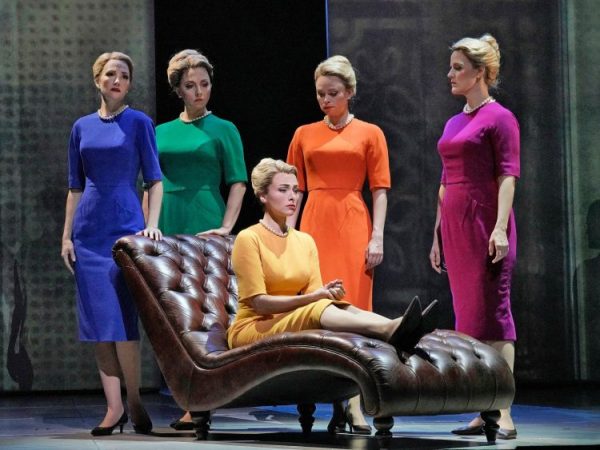
The Metropolitan Opera’s production of Marnie has received controversial press attention. The HD broadcast to cinemas by Fathom Events puts attention on its best features.
Commissioned by the Met, Marnie had its world premiere last year at the English National Opera. The High Definition transmission, of course, gives the advantage of seeing facial expressions and other details of the production.
Marnie seems like an excellent choice for an opera because of its intriguing central character and melodramatic story. From another perspective, however, it was a puzzling choice, considering that the 1964 Alfred Hitchcock movie was one of that director’s least acclaimed. The New York Times called it “the master’s most disappointing film,” notable for its icy cold heroine and a lead male with little charm compared to other Hitchcock heroes.
The opera is based on a 1961 novel by Winston Graham (because rights to the film were too difficult to obtain) which was set in England in the 1950s — a place where psychoanalysis was less accepted than in America — so Marnie’s problems remained more suppressed.
Director Michael Mayer told librettist Nicholas Wright and composer Nico Muhly that audiences would lose interest in the protagonists if they were unlikable. So he softened their image, which is a mixed blessing. The Tippi Hendren interpretation was so chilling that it piqued our curiosity, whereas Isabel Leonard’s image is sweet and we lose the ingredient of creepiness.
The Met production is visually arresting and the performances are superb. Yet the totality fails to grip us. Audiences leaving the theater repeatedly said “Interesting story, blah music.” I’d go further and say that the story is cold. The 37-year-old Muhly is a favorite of avant garde aficionados and his orchestral writing is fascinating. Yet his vocal music, so far, has not been gripping.
There are two ways in which singing communicates with audiences. One is with melodies that touch the heart, as in Verdi, where the melodies convey the story. The other is by reflecting the patterns of speech, as in Debussy. Muhly takes neither of these paths. Where a speaking person would lower his or her voice, his music jumps upwards, and his accents don’t resemble normal speech.
The narrative is of a disturbed woman who repeatedly steals and changes her appearance and name. Clearly, her employers didn’t check social security numbers or credit reports. As she sings “Shall I be raven dark or fiery redhead?” she is hiding a trauma. Think of Moss Hart and Kurt Weill’s Lady in the Dark, but without the humor.
Isabel Leonard uses her good looks and warm voice appealingly. Christopher Maltman does admirable dramatic and vocal work in the ungrateful part of Marnie’s husband. Anthony Dean Griffey is impressive as Marnie’s bullying first boss. Countertenor Iestyn Davies is superb as the lustful brother of Maltman’s character, singing like a muted trumpet in the closest this opera comes to an aria, “Wounds never heal.” Denyce Graves sounds wonderful in her return to the Met stage as Marnie’s mother.
Sets and costumes are the main focus and are clearly transmitted through the live television direction of Habib Azar. The sets by Julian Crouch and 59 Productions consist of rapidly-sliding panels plus projections. Arianne Phillips’ costumes include fifteen changes for Marnie, and chic, brightly-colored dresses for four lookalikes who follow her around in green, blue, lavender and orange. The idea of her alter egos appearing is clever; the appearance of silent men hovering, however, is distracting.
Robert Spano impeccably led the Met orchestra through the complex score, while Donald Palumbo’s chorus did its usual excellent work.
This review originally appeared in The Opera Critic, the publication for opera professionals worldwide.